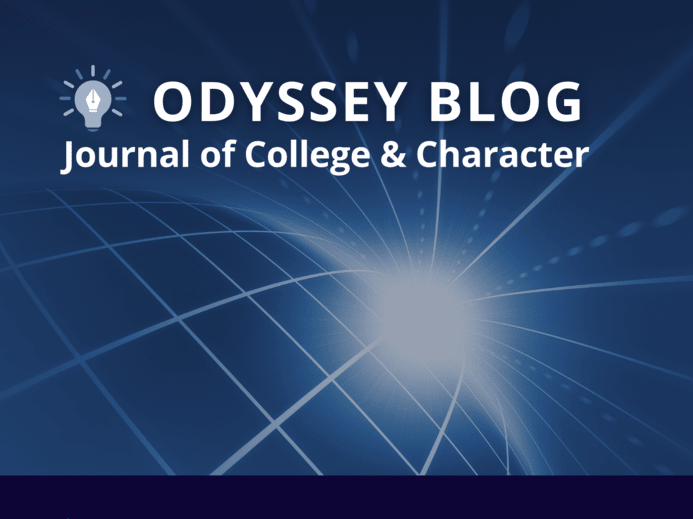
JCC Odyssey, Vol. 11 No. 1
February 13, 2025
February 2025, Vol. 11, No. 1
A Case for Caring: Humanizing the Student Experience (Part I)
Vic Massaglia Melody Kruzic Amy Martin
As student-facing professionals in higher education, we have seen it. Likely, you have as well. A student begins the session very engaged, motivated, and productive. Then something happens. They drop off and do not respond to outreach. Or, they share their struggles with you—struggles that seem so insurmountable that they don’t think they can continue in their studies. With six decades of experience in higher education student services and teaching, we have encountered numerous students facing challenges, such as fear of being forced to return to their home country, homelessness, domestic abuse, physical and mental health issues, or increasing responsibilities at work or home—or any combination of these and other challenges. Read More.
Peer Mentorship: A Lifeline for International Students Navigating Success and Growth
Navigating college life can be particularly challenging for international students who must adapt to new academic environments, cultural norms, and social systems. In this landscape, peer mentorship programs offer a powerful means of support. They provide students with the guidance needed for academic success, personal development, and community integration. This article draws from real-world examples, research insights, and best practices to highlight the benefits of peer mentorship programs, focusing on how these initiatives impact the academic and personal growth of international college students. Read more.
Cultivating Trust as an Early-Career Professional in Higher Education Administration
Trust is the cornerstone of successful relationships in any field, but perhaps nowhere is it more critical than in higher education. As early- and mid-career professionals, we step into civic institutions that are expected to be pillars of knowledge, integrity, and service. Whether working in student affairs, academic administration, or governance, trust is the unseen foundation that allows us to benefit from cross-collaboration, transparent communication, and ethical decision-making. Read more.
Carrying More Than Textbooks: Navigating Grief and Growth in College
As I reflect on my academic pathway, I recognize that there are mundane and repetitive topics associated with the college experience. In my work with higher education philanthropies and educational institutions, I have read many articles about advising incoming or current students, encouraging them to attend class and office hours, perform well, fill out their FAFSA—you know the rest. Something that caught me off guard in my journey was the amount of grief I had throughout my undergraduate and graduate studies. Student grief is a topic I feel is stigmatized and overlooked, and one I have not seen discussed in higher education literature. Read more.
Applying a Critical Climate Education Lens to Generative AI
Thesis: True sustainability requires a shift in mindset. Generative artificial intelligence (GenAI) has created opportunities for college instructors to initiate conversations that help us practice thinking differently. Read more.
The Conundrum of Miswanting: An Overlooked Issue in Student Career-Life Planning
“How is it possible to get what we want and yet not like what we get?” Gilbert & Wilson (2000) Read more.
Learning the Hidden Curriculum of Academic Freedom
A primary purpose of U.S. higher education is to conduct teaching and promote learning. Yet, the system often relies on many of its members to know and understand certain tenets of higher education without ever formally teaching it. A few critical pillars support the success of U.S. higher education, and their importance is growing as the sector faces significant criticism and outright attacks from outside actors. Academic freedom—a central tenet of higher education—fits somewhere within both of these categories. It is assumed that most faculty members and graduate students understand academic freedom, despite never being formally taught about it. Read more.
Sense of Belonging and Students’ Success: International Students in the Residence Halls
Francisca Owusu Margaret R. Kahler
This article examines how international students in the resident halls at a predominantly white institution (PWI) find a sense of belonging. For this study, a qualitative research method involving the use of interviews was used in the data collection. Overall, international students in the residence halls felt connected to their communities when people accepted their thoughts, provided them with assistance, and acknowledged their efforts. Read more.
The Impact of the COVID-19 Pandemic on the Sense of Belonging of African International Students
Pearl Irene Oppong Bismark Wiafe Bimpong
This study examines how African international students at a research university found a sense of belonging on campus during the COVID-19 pandemic. The study adopted a qualitative research approach using semi-structured interviews. The findings revealed that African international students at the research university found a sense of belonging through student unions, a good campus culture and environment, student affairs professionals, and peers. Read more.
The Impact of Generative AI Educational Chatbots on the Academic Support Experiences of Students in U.S. Research Universities
The integration of generative AI (GenAI) educational chatbots into the academic support experiences of international students in U.S. research universities presents a multifaceted impact on their educational journey. Using a review of literature, this article explores the impact of generative AI educational chatbots on the academic support experiences of international students. After gathering and evaluating content from three databases and analyzing and synthesizing data from a variety of journals, my findings indicate that the use of AI enhances students’ academic performance and engagement. Read more.
Leveraging the Power of Resilience in Your Higher Education Career
Resilience. This word gets tossed around quite a lot lately, doesn’t it? We hope our children will become resilient. We want the college students we serve to demonstrate their capacity for resilience. And for those of us building our careers on college campuses, we find ourselves wanting Resilience as well. Read more.